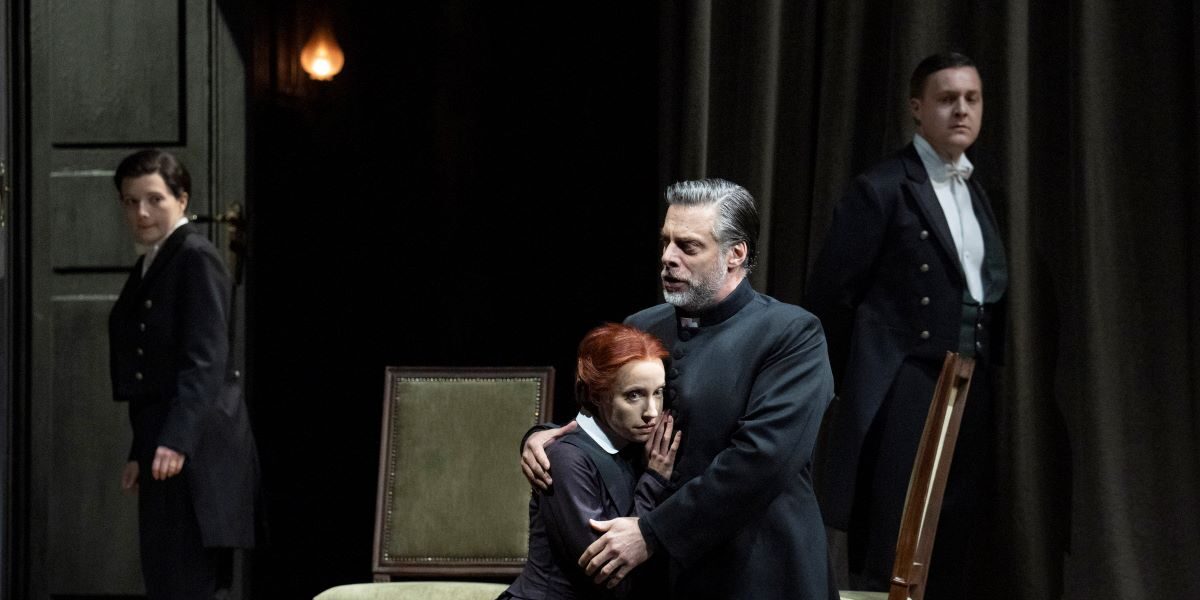This production is a first in a number of ways. It is the first time Wagner’s final opera has received performance at Glyndebourne, and it is the first venture into Wagner by director, Jetske Mijnssen, and a number of other key members of the creative team. The result vindicates the fit between composer and opera house, in case there remained any doubts: indeed it is musically a triumph. But the direction and framing it receives is only intermittently successful.
From the moment the famous orchestral prelude begins you know that this is going to be a distinguished evening in the pit. The warm acoustic of the house together with the carefully calibrated dynamics of conductor, Robin Ticciati, produce exactly the right quality of diaphonous, other-worldly luminosity. As the opera progresses, all the orchestral showpieces land precisely – the Transformation music builds as impressively as the slow movement of a Bruckner symphony; the anguished, angular chromaticism of the preludes to Acts 2 and 3 are unimpeachable examples of precise scene-painting; the cumulative, clotted, grinding harmonies of Titurel’s funeral ram home Amfortas’ guilt, and the Good Friday Music lovingly unfurls, with each phrase like an opening petal within the natural efflorescence it aims to depict, though unfortunately not visually mirrored in the production.
And here is the rub.
Any director of this opera has to make some decisive choices. The strands of the plot are a mish-mash of religiosity, mythology, and proto-Freudian psychology grounded in the original function of the piece as the consecration work of the Bayreuth Festival. No production can hope to encompass all these themes, but you have to try to throw a bridge between as many as you can. In this production, dramaturg Marius Bolten reconfigures the characters as a dysfunctional family, with Klingsor and Amfortas redefined as a pair of brothers whose hostility stems from rivalry over Kundry. This central triangle is then framed within a Chekhovian aesthetic set in 1882, the year of the opera’s premiere.
There are undoubted gains here, especially in elaborating Klingsor, left underdefined in the original, and homing in on the full significance of the imagery of psychological wounds and a longing for death. But a lot is left out too. Somehow you have to make sense of the overarching themes of redemption and purification for all the characters individually and for the Grail Community as a whole, and at too many points key musical episodes seemed unanchored in a dramatic setting that adds value and meaning.
The vocal skills on display are very impressive. In the title role Daniel Johansson has the measure of the high-points, especially in the crucial final scene of Act 2. Auden Iverson captures the anguish of Amfortas with memorable intensity, and Ryan Speedo Green makes much more of Klingsor than is usually the case. Veteran John Tomlinson has little to sing as Titurel, but is a powerful dramatic presence for much of the action. Kristina Stanek, appearing as Kundry, rises splendidly to the vocal and acting challenges of Act 2, as her character winds up through the gears of psychological manipulation to confront Parsifal with his fraught Oedipus complex.
However, any performance of this opera rests squarely on the shoulders of the singer enacting the role of Gurnemanz, and here John Relyea is quite outstanding. His unflagging, velvety bass and dignified presence make the long narrations of the outer acts utterly compelling, with precisely audible German diction exquisitely pointed and huge tonal variety. This is the stand-out performance of the evening, alongside the immaculate work of the Glyndebourne Chorus, as resonant on stage as they are ethereal up in the Gods.
The other creative contributions evoke the same mixed feelings as the overall production. The shuttered, claustrophobic sepia interiors of Ben Baur’s set feel apposite and compelling at times; but you miss the blaze of colour that is available in Klingsor’s magic garden and the final blossoming of Easter. There are some impressive lighting designs by Fabrice Kebour, with the funeral sequence in particular a real success; and the clever, sinuously desperate choreography of Dustin Klein makes real sense of the erotic fakery of the Flower Maidens. But the dramatic pulse is sapped not quickened by the plethora of walk-on roles that depict the characters in old age.
Wagner productions predictably divide opinion, just as their composer always has and always will. This is a thoroughly absorbing evening with as convincing an account of the score as you are likely to hear, and a production that is provoking in every sense of the term, good and bad.
Libretto & Music: Richard Wagner
Conductor: Robin Ticciati
Director: Jetske Mijnssen
Cast includes: Ryan Speedo Green, Auden Iverson, Daniel Johannson, John Relyea, Kristina Stanek. John Tomlinson
Until 24 June 2025
6 hrs 10 mins, with two intervals
Photo Credit: Richard Hubert Smith

